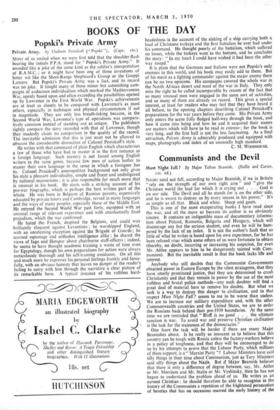BOOKS OF TIIE DAY
Popski's Private Army
Private Army. By Vladimir Peniakott (" Popski "). (Cape. z6s.) MOST of us smiled when we were first told that the shoulder-flash bearing the initials P.P.A. stood for "Popski's Private Army." It sounded like a joke of the same kind as the soldier's interpretation of R.A.M.C. ; or it might have been on of those inventions of bitter wit like the Short-Range Shepheard's Group or the Groppi Lancers. But Popski's Private • Army was a fact, and its record was no joke. It fought many of those minor but astonishing cam- paigns of audacious individualism which marked the Mediterranean War, openly based upon and often exceeding the possibilities opened up by Lawrence in the First World War. Popski's achievements are at least as closely to be compared with Lawrence's as most others, especially in technique and physical circumstances if not En magnitude. They are only less breath-taking because, in the Second World War, Lawrence's type of operations was compara- tively common instead of standing out as unique. The publishers rightly compare the story recorded with that of Lawrence, though they modestly claim no comparison in the quality of the record. The inevitable admission that this is just must not be allowed to obscure the considerable distinction of Colonel Peniakoff's style.
He writes with that command of plain English which characterises a few of those who have had to master it in the first instance as a foreign language. Such mastery is not found among English writers in the same genre, because few men of action bother to master their own language in the sense in which a foreigner has to. Colonel Peniakoff's cosmopolitan background not only gives his style a pleasant individuality, simple and fluent and undisfigured by national mannerisms ; it is also responsible for much more that is unusual in his book. He starts with a striking account of his pre-war biography, which is perhaps the best written part of the whole. He was born in Belgium of Russian parents, expensively educated by private tutors and Cambridge, versed in many languages and the ways of many peoples, especially those of the Middle East. He entered the Second World War past forty, equipped with an unusual range of relevant experience and with unashamedly fixed prejudices, which the war confirmed. He hated the French, despised the Belgians, and could wax brilliantly eloquent against Levantines • he worshipped England, with an unrelenting exception against the Brigade of Guards ; he scorned espionage and orthodox intelligence alike: he shared the views of Iago and Hotspur about chairborne staff-officers ; indeed, he seems to have thought academic training a waste of time even for Egyptology, though his own preparations for action were always meticulously thorough and his self-training assiduous. On all this and much more he expresses his personal feelings frankly and force- fully, with an obvious honesty that leaves no danger of the reader's failing to carry with him through the narrative a clear picture of its remarkable hero. A typical instance of his ruthless hard- headedness is the account of the sinking of a ship carrying both a load of Christmas turkeys and the first battalion he ever had under his command. He thought poorly of the battalion, which suffered no losses, while the turkeys went to the bottom, and he concludes the story: "In my heart I could have wished it had been the other way round."
It is plain that the Germans and Italians were not Popski's only enemies in this world, and his book may easily add to them. But of his merit as a fighting commander against the major enemy there can be no two opinions. His campaigns covered the whole war in the North African desert and most of the war in Italy. They only miss the right to be called incomparable by reason of the fact that so many unusual men were engaged in the same sort of activities, and so many of them are already on record. This gives a special interest, at least for readers who may feel that they have heard it all before, to the opening chapters describing Colonel Peniakoff's preparations for the war years before they came. His Private Army only enters the scene fully fledged half-way through the book, and how it came into being and how he and it acquired their names are matters which will have to be read in extenso ; for the book is very long, and the first half is not the less fascinating. As a final attraction, Private Army is admirably produced and equipped with maps, photographs and index of an unusually high standard.
C. M. WOODHOUSE.


































 Previous page
Previous page